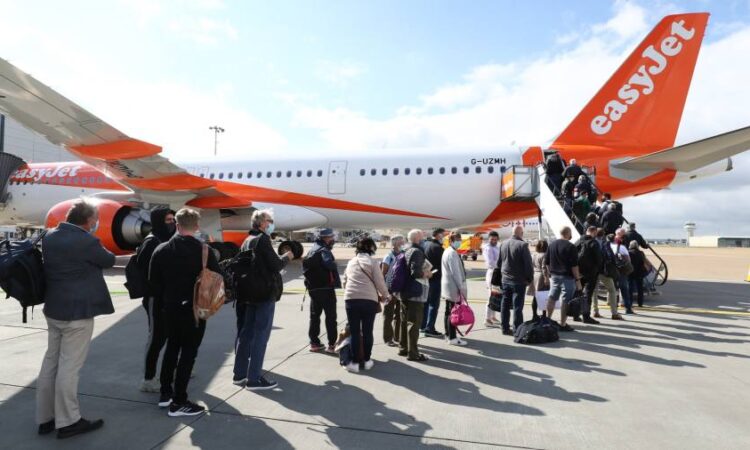
Airline passengers are facing higher fares under newly strengthened EU rules designed to tackle aviation emissions in a sign that the era of super low-cost air travel may be about to end.
The threat of higher fares comes as carriers put up prices to help them recover from the coronavirus pandemic on the back of renewed demand for flights with the end of travel restrictions.
The EU wants to force carbon-intensive industries to pay more for their pollution with ticket prices rising as much as €10 per return flight due to increased levies on aviation emissions, according to analysts.
EU lawmakers have given initial approval to an update of the bloc’s carbon pricing rules, which forces industries including aviation to buy enough allowances to cover their pollution under the emissions trading system.
The rules phase out the current practice of allowing airlines to obtain a significant proportion of the permits they need for free by 2026. The total number of allowances in the system will also fall over time, which analysts expect to drive up prices.
Olivier Jankovec, director-general of airports industry body ACI Europe, told an industry conference that the EU was going through “a major policy reset” that would change “the economics of the sector”. “It is going to result in increasing costs for airlines, increasing fares and lower demand.”
Airlines for Europe, the lobby group, said that “sustainability legislation such as the EU’s . . . could see flying via EU hubs like Amsterdam, Paris or Frankfurt becoming about 23-29 per cent more expensive in 2035”. It said this could lead to up to 17 per cent less passengers travelling through EU hubs.
Ryanair boss Michael O’Leary has previously said that rising environmental taxes, alongside higher oil prices, meant that the era of “absurd[ly]” cheap fares is over.
The cost of complying with the EU ETS would rise to €5bn in 2027 for the six largest intra-EU carriers, up from €0.5bn in 2019, Bernstein analyst Alex Irving estimated. “Airlines cannot absorb that . . . and will need to increase prices,” he said.
Passengers would end up paying between €8 and €10 more per return flight, he added.
Deutsche Bank analyst Jaime Rowbotham estimated that Ryanair, easyJet and Wizz Air would spend a cumulative €785mn on carbon allowances in their 2023 fiscal years, equivalent to about €2.60 per passenger journey. That could rise to €2.25bn by the middle of the decade, he said.
EasyJet has said it is impossible to predict future prices, but that the industry needed more government support to reach net zero.
Ryanair last year reported spending €51mn on credits and said that “in the medium to longer term” it would not be able to “eliminate” the impact of the rising cost of allowances by forward hedging.
The price of allowances in the EU system were trading at close to their all- time highs, near €100 a tonne on Friday. Revenues from the ETS will be put towards schemes to boost the use of sustainable aviation fuels.
Airline emissions count for about 3 per cent of EU greenhouse gas emissions, the large majority of which comes from international flights.
Europe’s emissions trading system is a flagship element of the EU’s plan to cut greenhouse gas emissions by 55 per cent by 2030, compared with 1990 levels.
Environmental groups said the scheme is an effective way to control carbon emissions, and have pushed for it to be extended further.
“Carbon pricing is an essential tool for emissions reduction in Europe . . . it’s only right that airlines pay their fair share for emissions,” said Jo Dardenne, Aviation Director at Transport & Environment, an NGO.
Bas Eickhout, a Green MEP, has pushed for free allowances to be phased out as soon as possible, calling them a “fossil fuel subsidy”.
Airlines have been covered by the ETS since 2012, though only for flights within the European Economic Area. An effort to broaden this to flights outside the area was successfully opposed by countries including China and the US.
European airlines are not only facing an increased cost for their carbon emissions. The EU is also negotiating rules to enforce the uptake of sustainable aviation fuels — less polluting alternatives to fossil fuels — as well as increased taxes on kerosene.
The emissions trading system update will not come into effect until the final law has been approved in a vote by the European parliament and by EU environment ministers in the spring.





